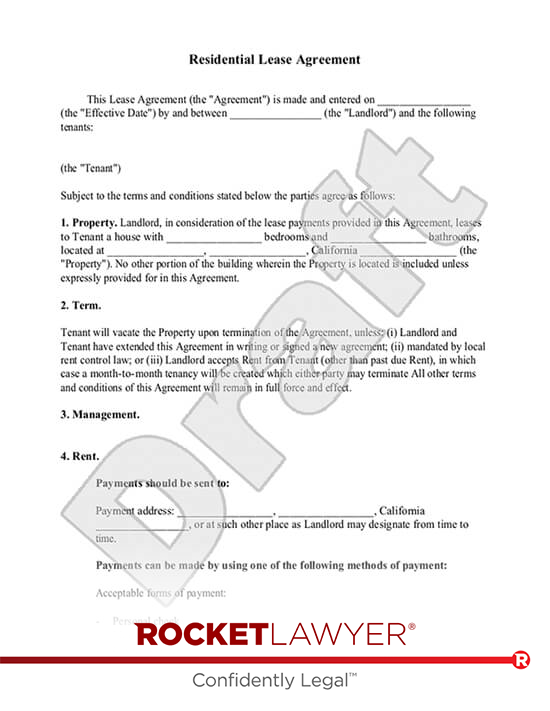How can I reasonably limit the number of guests my tenants have during the holidays in my state?
The main way to maintain limits on the number of guests a tenant can have during the holidays is through the Lease Agreement. Some leases contain specific limits on guests. Others may list a set of general or community rules. Those rules may set limits on guests.
State law may vary on what limits landlords can set. Many states do not have specific rules and leave it to the Lease Agreement. Other states say that a landlord cannot unreasonably restrict guests and that unreasonable restrictions in the lease cannot be enforced. Exactly what a state considers reasonable and unreasonable may vary. The terms could be defined specifically in a state or city code, or it could depend on how judges have ruled in past court cases. To get a quick and dependable answer, reach out to a Rocket Legal Pro™.
Landlords may also have the right to require their tenants to follow local laws, like fire codes. A tenant may not have the right to have a number of guests that exceeds the total number of people allowed in the building or their unit.
How do I decide limits on the number of guests or how long they can stay?
If you want to limit the number of guests or length of stay, the rules you make should be tied to a specific legal or practical concern. This can help to convince both tenants and a judge that your lease rules are reasonable if you ever get into a dispute.
For example, many landlords limit the length of stay because they do not want guests to become tenants if they are not named in the lease. State law might give a person the same rights as a tenant after they have stayed there for two weeks, a month, or a certain number of days within a certain period of time. Landlords generally want guests to leave before this amount of time has passed. They may also want to know about any guests who are staying longer than a few nights so that they can prevent them from overstaying.
You might have a harder time setting a limit on the number of guests. The main concerns are usually noise, damage, and safety. It can depend on the size of the rental unit, how close the neighbors are, and if there are any legal limits on how many people can occupy, live, and sleep in a building or unit. It can be helpful to find out if there are any typical rules that landlords follow in your area, and then decide if you want to follow them too.
What types of lease provisions can I include to limit the number of guests?
There are a handful of lease provisions you may want to include to limit the number of guests, including:
- Specific limits on the number of guests and length of stay.
- Differences between a party or temporary visit versus overnight stays.
- Specific hours when tenants must be quiet to avoid disturbing neighbors.
- Limits on the number of guests who can use common areas, like a community pool, to reduce disturbances and leave those areas open for other tenants.
- Requirements for tenants to follow all fire codes, local laws, or other relevant laws.
What can I do if a tenant's holiday party becomes too big or disruptive?
Many problems with tenants can be solved with a simple reminder. They may have forgotten the rules or simply gotten carried away in the moment. While some may not be reasonable, many will be.
If there is an ongoing disruptive party where the tenant is refusing requests from you or their neighbors to settle things down or send people home, you may want to call local law enforcement. The police may be able to take action if, for example, the party is violating noise laws or there is underage drinking.
For more serious situations or if the problem keeps repeating, you may want to send the tenants a written warning that they are violating your lease. The next step after that is often to send an Eviction Notice.
Can I require tenants to get permission before having long-term holiday guests?
Whether you can require tenants to get permission before having long-term holiday guests often depends on your lease and local laws. In many places, you can require your tenants to let you know about these plans ahead of time. You may be required to give them permission unless you have a good reason to refuse, such as if they would be breaking a lease provision. Another good reason might be that you have specifically banned a certain guest for violating your rules.
If your tenant plans to have a guest stay long enough to legally become a tenant, you may want to require both the tenant and the guest to sign a Lease Amendment. Some places may require you to add a requested tenant to the lease if they meet your screening requirements, won't exceed the number of people allowed in the unit, and sign the required paperwork. While you may not have wanted the new tenant, by having them sign a Lease Agreement, you may enforce the other rules in the lease, such as requiring everyone to have renters insurance.
To learn more about the specific limits you can place on your tenants' guests, or to get help updating your Lease Agreement or other legal documents, reach out to a Rocket Legal Pro™.
Please note: This page offers general legal information, not but not legal advice tailored for your specific legal situation. Rocket Lawyer Incorporated isn't a law firm or a substitute for one. For further information on this topic, you can Ask a Legal Pro.
